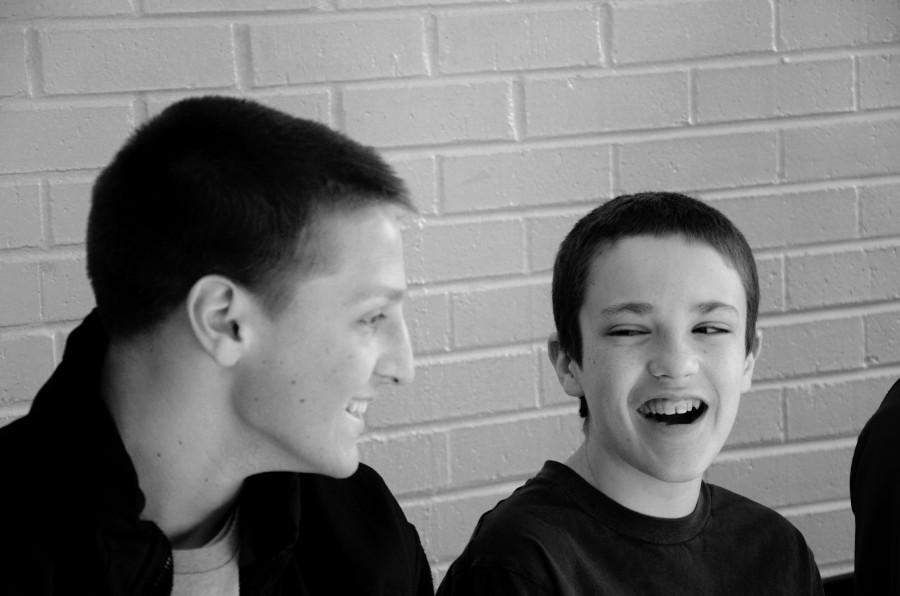Leaders are often times the people who take control, teach lessons, and act as role models. However, sometimes the leaders are the ones learning and growing, and the people they are in charge of become the role models.
In the Special Needs Athletic Program (SNAP), each athlete preparing for the Special Olympics games has one or more leaders, who are the student members of SNAP, to help him or her train for the event. Over the course of training, Meghan Mowinski, SNAP sponsor and adapted P.E. teacher, said the leaders learn many valuable lessons.
“I see a huge growth in the leaders. They start as freshmen, and you just see them mature and grow into being comfortable around a variety of different people. They just learn to work with others,” Meghan Mowinski said. “You know sometimes, especially with SNAP, things don’t always go as planned, and just seeing the resiliency [of the leaders], and how the leaders have to figure out what do, what will work, what won’t work, I just see such a growth in them.”
Layne Self, senior leader, agrees that she has grown and learned several lessons from the start of being a leader in the SNAP program freshman year to where she is now as a senior.
“I think for me, I’ve learned to be patient. You really have to learn how to cooperate with others, because sometimes [the athletes] don’t cooperate with you, and you have to be patient and try a new way to make them listen,” Self said.
Matt Moon, junior, agrees that SNAP has taught him many lessons that can apply to more than just leading for Special Olympics.
“I think the main thing you learn from working with the kids is patience and tolerance. Sometimes you get frustrated, and you have to use different techniques. I’ve learned when you have to be stern and when you have to be nice to [the athletes],” Moon said. “[Leading] helps you think in more than just one way when you have to. You don’t use the same technique with every kid, you have to be open-minded and think in various ways, which applies to other aspects of life too.”
Self and Moon believe they were able to learn these lessons because of all the time they spend with their athlete preparing for Special Olympics. Meghan Mowinski said the leaders and athletes form close relationships.
“[The athletes and leaders] really form a great friendship. It’s not so much the leaders dictating to the [athletes], they kind of just work with them,” Meghan Mowinski, SNAP sponsor and adapted P.E. teacher, said. “A big part of our training is just socialization, getting to know the athlete and just kind of hanging out, and also training for the events. It’s kind of a combination of that, and it’s just happy. [The athletes and leaders] are always smiling, and laughing, and having a great time. They truly become friends with their partners.”
Kylie Mowinski, senior leader, agrees that the relationship between the athletes and the leaders is one of mutual friendship instead of a coach-athlete or teacher-student relationship.
“You just try to act like you would act if you were making friends with anyone else. You treat [the athletes] like you would any other friend because they are your friend,” Kylie Mowinski said.
Kylie Mowinski and Self work together with the same athlete, and through this friendship, Self said she not only learns life lessons, but she said that she has also discovered a part of what makes everyone in SNAP have a positive attitude.
“I think how [the athletes] approach any challenges – they do it so well – shows that they’re ready to do anything. And when they accomplish something, I’m glad to see them do that,” Self said. “I just like how everyone’s always happy. It just puts you in a good mood being with kids who are so care-free and just love to participate in things.”
Moon also believes that there are rewards from helping his athlete train for Special Olympics.
“[When my athlete Mathew Burke, seventh grade, succeeds], it just makes me feel good because I get to see the smile on his face after he gets done with his event, and when everyone gives him a high-five, it makes you feel good about yourself knowing you were a part of making them happy,” Moon said. “And you’re doing something for more than yourself, it’s for the community and for the athlete.”
Meghan Mowinski also believes that SNAP is a wonderful environment for learning valuable life lessons while creating memories and developing relationships.
“I think [the leaders] learn compassion, I think they learn acceptance, I think they learn patience. You have to have a sense of humor, you have to be able to laugh at things. I just see [everyone in SNAP] having fun. It’s nice to walk into a program where the kids actually like to be there, where there’s a lot of laughing, and where everyone always has a good time.”

